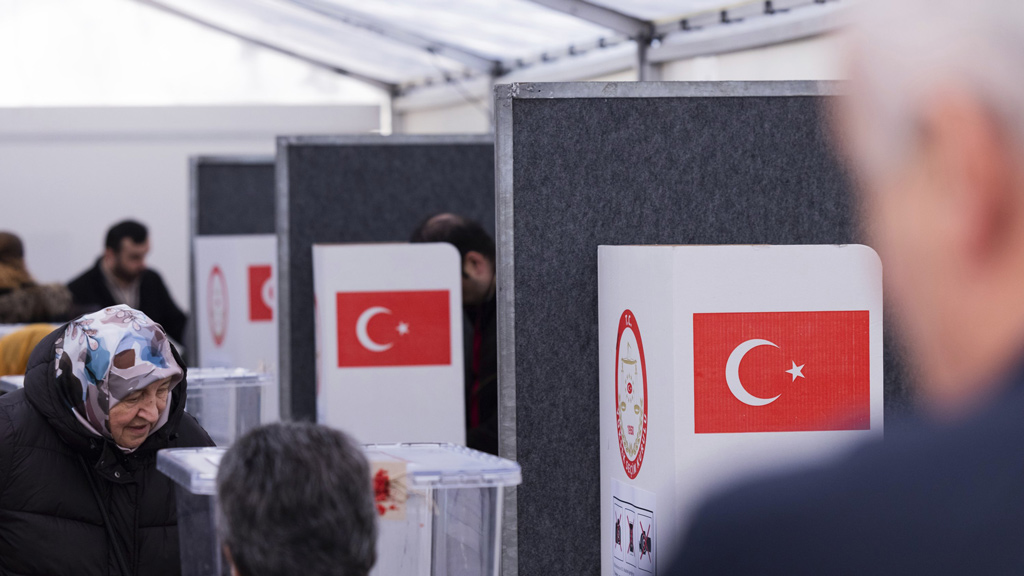Türkiye has reached the election’s home stretch as voters abroad began to cast their votes on Thursday.
The race between President Recep Tayyip Erdoğan and his main opponent, Republican People’s Party (CHP) Chair Kemal Kılıçdaroğlu, continues amid claims from both sides that they will win in the first round and a rhetorical escalation.
Since occupying the moral high ground matters in election campaigns, both candidates need to persuade voters that they are winning. That message appears to be a mixture of hope, confidence and criticism leveled at one’s opponent. That is why each side insists that they are inclusive and accuses the other side of discrimination.
The incumbent’s main advantage is that he harvested the fruits of his “politics of works” over the last couple of weeks.
On Thursday, an official ceremony was held to mark the delivery of the first fuel rods to the Akkuyu Nuclear Power Plant (NPP). Russian President Vladimir Putin, too, made an online appearance. Other projects that immediately come to mind include the indigenous electric car Togg, the drone carrier TCG Anadolu, the aircraft Hürkuş, the delivery of Black Sea natural gas to the mainland, and the launch of a new satellite called Imece.
The completion of such defense, energy and technology projects obviously appeals to the electorate’s patriotic side.
In contrast, Kılıçdaroğlu, who poorly managed the social security administration and runs a political party whose mayors have poor track records and broken promises, cannot say much when it comes to public works and service. Furthermore, he seems to have a hard time explaining to voters why terrorist organizations like PKK and the Gülenist Terror Group (FETÖ) have endorsed his presidential bid.
4 sources of uncertainty
Over the next few days, both candidates will insist that the presidential race must be settled in the first round.
Pro-CHP circles will mount additional pressure on Muharrem Ince, the Homeland Party (MP) leader who contested the 2018 presidential election on the CHP ticket, accusing him of “dividing the opposition.”
It obviously makes sense to try and declare victory in the first round. Türkiye has never held a second-round election and pollsters cannot reliably project how voters may behave in that case. In other words, we have zero experience with second-round elections and there are four sources of uncertainty that would make it impossible to guess how the electorate will think in the potential runoff:
First, we do not know how Erdoğan and Kılıçdaroğlu will perform on May 14 and who will take the lead. Second, we do not know how many parliamentary seats each party will control as a result of the parliamentary election, whose results will become clear on May 14. In other words, it remains unclear whether the People’s Alliance or the Nation Alliance will have the parliamentary majority – or if the Green Left Party (read: the pro-PKK Peoples’ Democratic Party (HDP)) will become kingmakers.
Thirdly, we do not know whom Muharrem Ince and nationalist bloc representative Sinan Oğan would ask their supporters to back in the second round. Finally, we do not know what kind of second-round campaign each candidate would run.
Those factors would certainly influence the electorate’s behavior in the second round of the presidential election.
Rhetorical escalation
As both sides make all the necessary pledges and use all possible arguments to win the race, they inevitably make allegations about the potential impact of the other side’s potential victory. Likewise, rhetorical escalation comes with the territory.
Regardless of which candidate wins, however, the political establishment has the responsibility to gracefully accept the Turkish people’s decision and do the necessary thing.
They have an obligation to oppose anyone imagining an antidemocratic and chaotic future for Türkiye after the 2023 elections – for the country’s sake. Candidates tend to attack each other over key issues like democracy and counterterrorism measures. To issue threats against civil society, however, represents an extreme step.
Having outsourced strong language to his political partners (starting with the Good Party (IP) Chair Meral Akşener) upon clinching the Nation Alliance’s endorsement, Kılıçdaroğlu released a new video this week to describe nongovernmental organizations with close ties to the Justice and Development Party (AK Party) as a “gang.”
He insinuated that, if elected, he would seek revenge on those organizations and argued that “war is a party for brave men.”
I wonder whether those folks, who take issue with the emphasis on accepting and respecting the legitimate election results, will dare utter a single word about the main opposition leader’s thinly veiled discourse of “war” and “gangs.”
In this article
- Opinion
- 14 May 2023 Turkish General Election
- 2023 Turkish General Elections Presidential Candidates
- 2023 Turkish Presidential Election
- Counterterrorism
- Daily Sabah
- Kemal Kılıçdaroğlu
- Meral Akşener
- Muharrem Ince
- Recep Tayyip Erdoğan
- Sinan Oğan
- Türkiye
- Türkiye's 2023 Elections
- Türkiye's Good Party (IP)
- Türkiye's Good Party (IP) Chairperson
- Türkiye's Homeland Party (MP)
- Türkiye's Homeland Party (MP) Chairperson
- Türkiye's Peoples' Democratic Party (HDP)
- Türkiye's Republican People's Party (CHP)
- Türkiye's Republican People’s Party (CHP) Chairperson
- Unseen Voters

